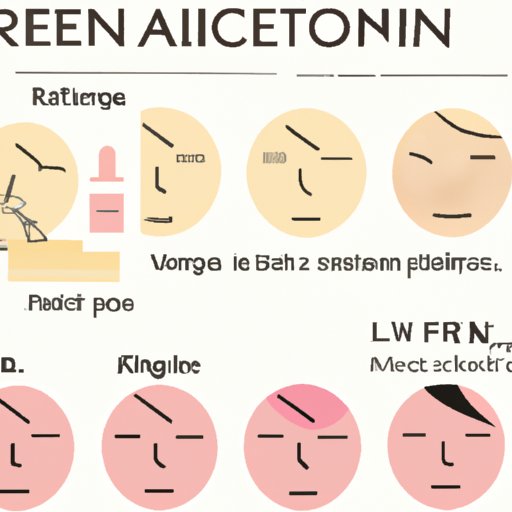Introduction
When it comes to skin care, there are a lot of ingredients out there that promise to do amazing things. One of the most popular and effective of these is retinol. But what exactly is retinol, and what does it do to the skin?
In this article, we’ll explore what retinol is, the science behind its effects on the skin, when and how to use it, and how it can help with different types of skin concerns. Read on to learn all about retinol and how it can benefit your skin.
Definition of Retinol
Retinol is a form of vitamin A that is commonly used in skin care products. It is a potent ingredient that can help improve the appearance of the skin by reducing signs of aging, improving texture, and helping to clear up acne.
Retinol is a derivative of vitamin A, which is an essential nutrient for healthy skin. It works by increasing cell turnover and stimulating collagen production, resulting in smoother, brighter, and healthier-looking skin.

Overview of Benefits for Skin Health
Retinol has many benefits for skin health. It can reduce fine lines and wrinkles, even out skin tone, and reduce the appearance of dark spots. It can also help treat and prevent acne by unclogging pores and reducing inflammation. Retinol can also help boost collagen production, leading to firmer, plumper skin.
Exploring the Science Behind Retinol’s Effects on Skin
Now that we’ve established what retinol is and how it can benefit the skin, let’s take a closer look at the science behind its effects.
How Retinol Works
Retinol works by increasing cell turnover and stimulating collagen production. When applied to the skin, it helps to speed up the process of exfoliation and cell renewal, resulting in smoother, brighter skin. Retinol also helps to stimulate collagen production, which helps to reduce the appearance of wrinkles and fine lines.
What Studies Show About Retinol’s Effects on the Skin
Studies have shown that retinol can be effective in reducing the appearance of wrinkles, improving skin texture, and treating and preventing acne. In one study, participants who applied a cream containing 0.1% retinol twice daily for 12 weeks showed significant improvement in the appearance of wrinkles and overall skin tone.
Another study found that those who applied a cream containing 0.05% retinol once daily for 12 weeks had significantly less acne lesions compared to the placebo group.
A Guide to Incorporating Retinol Into Your Skin Care Routine
If you’re considering incorporating retinol into your skin care routine, there are a few things to keep in mind. Here’s a guide to using retinol properly so you can get the most out of it.
When to Use Retinol
Retinol should be used at night, as it can make your skin more sensitive to sunlight. It’s best to start slowly and gradually increase the amount of retinol you use over time. Start with a lower concentration (0.025%) and work your way up to a higher concentration (0.1%) if needed.
How to Use Retinol Properly
It’s important to use retinol correctly in order to get the most out of it. Start by cleansing your face thoroughly. Then, apply a thin layer of retinol to your face and neck, avoiding the eye area. Finally, follow up with a moisturizer to help protect your skin from any irritation.

How Retinol Can Help Address Different Types of Skin Concerns
Retinol can be beneficial for addressing a variety of skin concerns, from acne to wrinkles. Here’s a look at how it can help with different types of skin concerns.
Acne
Retinol can help treat and prevent acne by unclogging pores and reducing inflammation. It can also help reduce the appearance of acne scars. For best results, it’s important to use a gentle cleanser and moisturizer along with the retinol.
Wrinkles and Fine Lines
Retinol can help reduce the appearance of wrinkles and fine lines by stimulating collagen production and increasing cell turnover. It can also help to firm and plump the skin, making it look younger and more vibrant.
Uneven Skin Tone
Retinol can help even out skin tone by reducing the appearance of dark spots and discoloration. It can also help to lighten and brighten the skin, giving it a more even and luminous complexion.

Common Myths About Retinol and the Skin Debunked
There are a lot of misconceptions about retinol and its effects on the skin. Here are a few common myths debunked.
Myth 1: Retinol will make your skin dry and flaky
While retinol can cause some dryness and flaking, this is usually only temporary. To minimize any discomfort, it’s important to use a gentle cleanser and moisturizer, and to gradually increase the amount of retinol you use over time.
Myth 2: Retinol will make your skin look red and irritated
Retinol can cause some redness and irritation, especially when first starting out. However, this should go away after a few weeks as your skin gets used to the retinol. It’s also important to use a gentle cleanser and moisturizer to help minimize any irritation.
Myth 3: Retinol will make your skin sensitive to the sun
Retinol can make your skin more sensitive to the sun, so it’s important to always wear sunscreen when using it. It’s also important to use retinol at night, as this will help minimize any sensitivity.
Conclusion
Retinol is a powerful skincare ingredient that can help improve the appearance of the skin. It can reduce the appearance of wrinkles and fine lines, even out skin tone, and help treat and prevent acne. When used properly, retinol can be a great addition to any skin care routine.
So there you have it – a comprehensive guide to retinol and its effects on the skin. Keep in mind that everyone’s skin is different, so it’s important to consult with a dermatologist or skin care professional before incorporating retinol into your routine.
With the right knowledge and products, retinol can help you achieve healthier, younger-looking skin.


